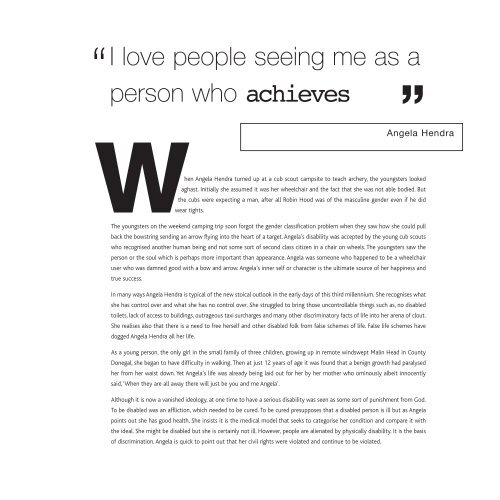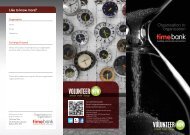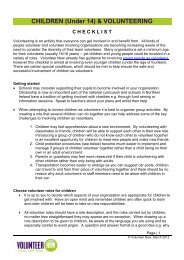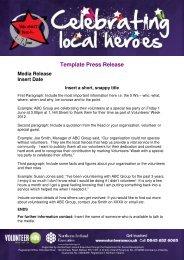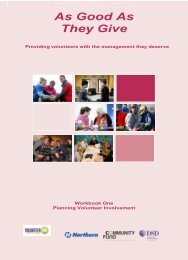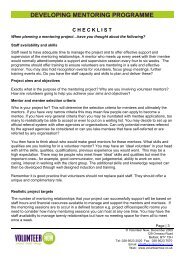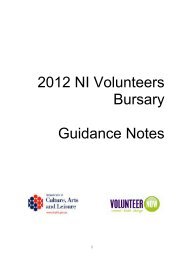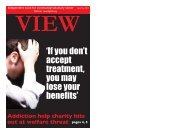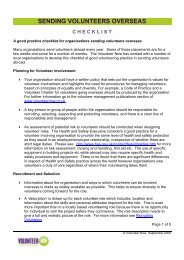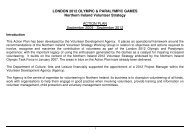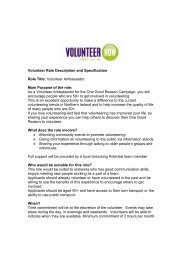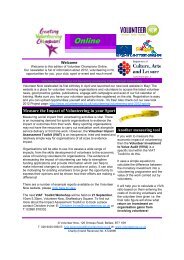Stories from the Edge - Volunteer Now
Stories from the Edge - Volunteer Now
Stories from the Edge - Volunteer Now
You also want an ePaper? Increase the reach of your titles
YUMPU automatically turns print PDFs into web optimized ePapers that Google loves.
“I love people seeing me as aperson who achieves”When Angela Hendra turned up at a cub scout campsite to teach archery, <strong>the</strong> youngsters lookedaghast. Initially she assumed it was her wheelchair and <strong>the</strong> fact that she was not able bodied. But<strong>the</strong> cubs were expecting a man, after all Robin Hood was of <strong>the</strong> masculine gender even if he didwear tights.The youngsters on <strong>the</strong> weekend camping trip soon forgot <strong>the</strong> gender classification problem when <strong>the</strong>y saw how she could pullAngela Hendraback <strong>the</strong> bowstring sending an arrow flying into <strong>the</strong> heart of a target. Angela’s disability was accepted by <strong>the</strong> young cub scoutswho recognised ano<strong>the</strong>r human being and not some sort of second class citizen in a chair on wheels. The youngsters saw <strong>the</strong>person or <strong>the</strong> soul which is perhaps more important than appearance. Angela was someone who happened to be a wheelchairuser who was damned good with a bow and arrow. Angela’s inner self or character is <strong>the</strong> ultimate source of her happiness andtrue success.In many ways Angela Hendra is typical of <strong>the</strong> new stoical outlook in <strong>the</strong> early days of this third millennium. She recognises whatshe has control over and what she has no control over. She struggled to bring those uncontrollable things such as, no disabledtoilets, lack of access to buildings, outrageous taxi surcharges and many o<strong>the</strong>r discriminatory facts of life into her arena of clout.She realises also that <strong>the</strong>re is a need to free herself and o<strong>the</strong>r disabled folk <strong>from</strong> false schemes of life. False life schemes havedogged Angela Hendra all her life.As a young person, <strong>the</strong> only girl in <strong>the</strong> small family of three children, growing up in remote windswept Malin Head in CountyDonegal, she began to have difficulty in walking. Then at just 12 years of age it was found that a benign growth had paralysedher <strong>from</strong> her waist down. Yet Angela’s life was already being laid out for her by her mo<strong>the</strong>r who ominously albeit innocentlysaid, ‘When <strong>the</strong>y are all away <strong>the</strong>re will just be you and me Angela’.Although it is now a vanished ideology, at one time to have a serious disability was seen as some sort of punishment <strong>from</strong> God.To be disabled was an affliction, which needed to be cured. To be cured presupposes that a disabled person is ill but as Angelapoints out she has good health. She insists it is <strong>the</strong> medical model that seeks to categorise her condition and compare it with<strong>the</strong> ideal. She might be disabled but she is certainly not ill. However, people are alienated by physically disability. It is <strong>the</strong> basisof discrimination. Angela is quick to point out that her civil rights were violated and continue to be violated.


